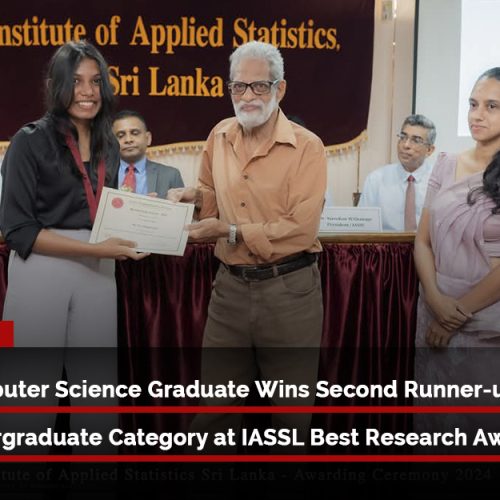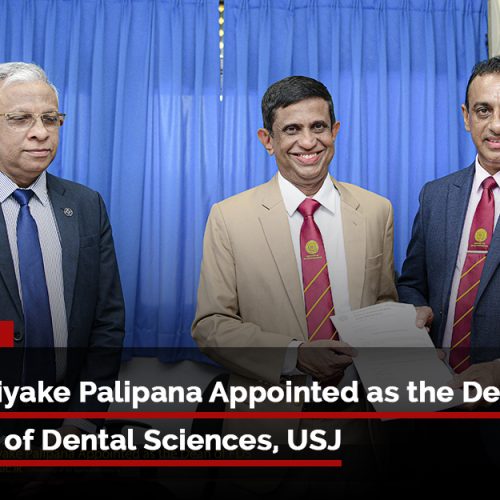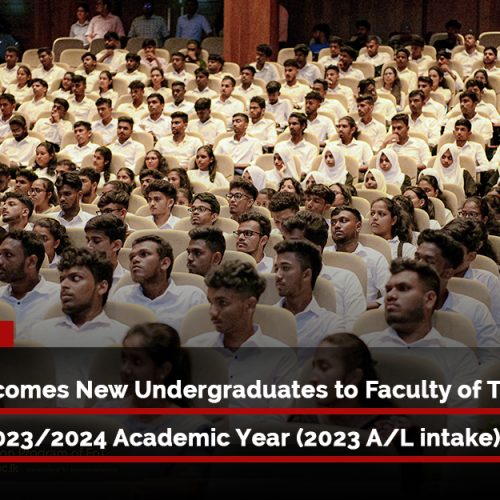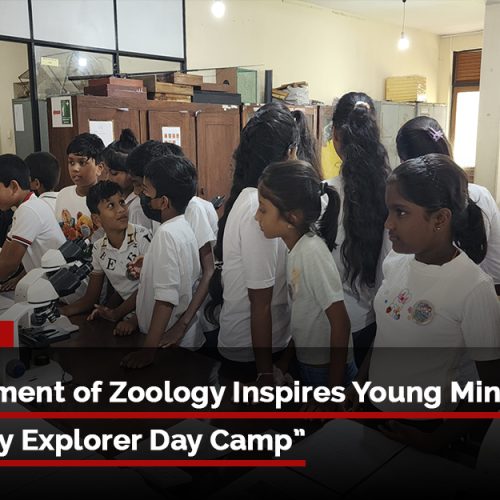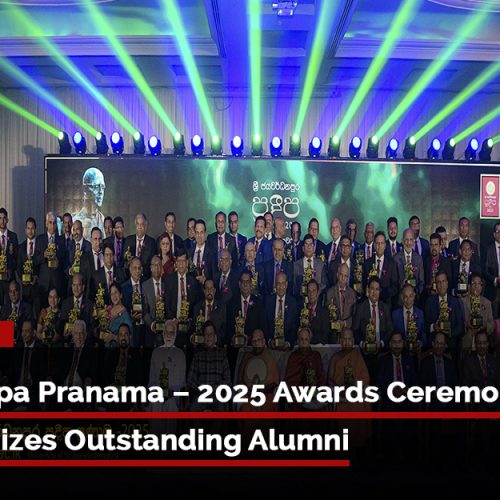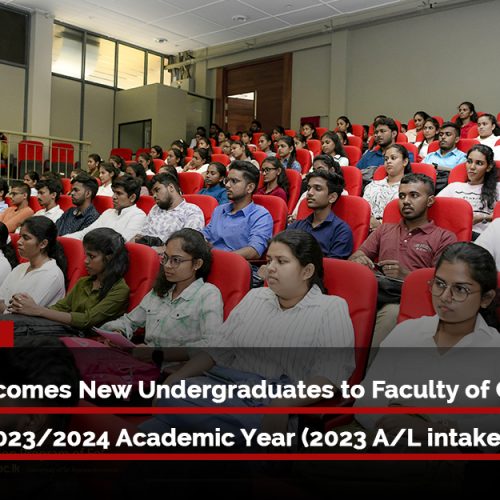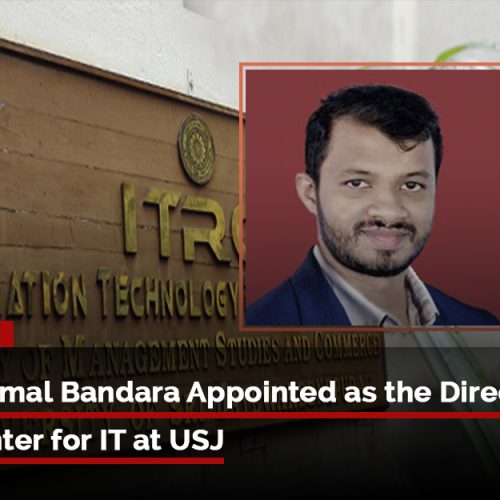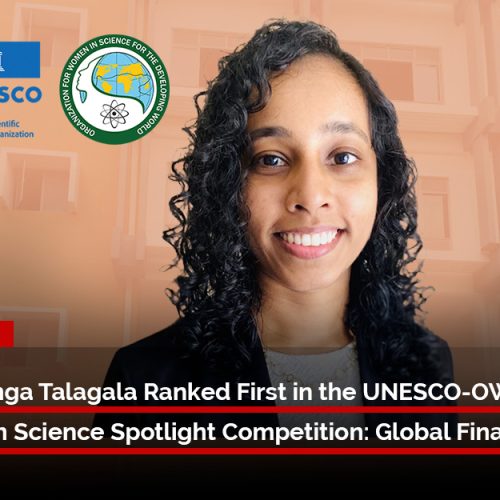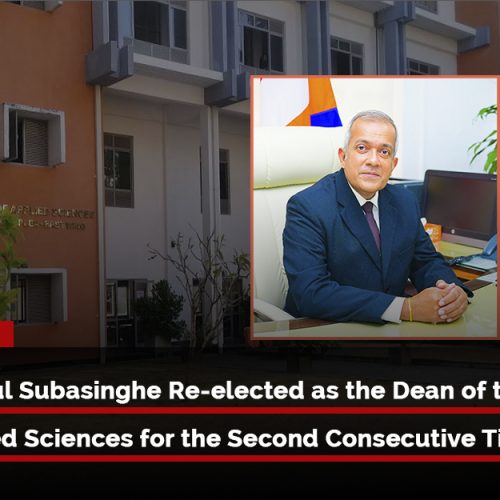The 12th International Conference on Business Management (ICBM) 2015, an annual research conference organised by the Faculty of Management Studies and Commerce, University of Sri Jayewardenepura, concluded on a high note, providing a great platform for researchers, educators, learners, academics, practitioners and policymakers both in the local and international arena to share knowledge among each other.This year’s conference was based on a contemporary theme, ‘Future Sustainability, Governance and Ethics,’ which focused on significant managerial concerns pertaining to academia and practitioners in the corporate and public sector organisations.The objectives of the conference were to promote and publish relevant and current ideas on sustainability, governance and ethics, to disseminate knowledge on the theme ‘Future Sustainability, Governance and Ethics’ to a wider community and to enhance relationships and build a network between academics and practitioners.
The keynote speaker was Prof. Ferdinand A. Gul – Head, Accounting and Finance and Director of Research of the School of Business, Monash University, while Prof. Rohana Kuruppu CEO of Brandix College of Clothing Technology and Professor of Fashion and Textiles – RMIT was the Chief Guest of the ICBM 2015.The key events of ICBM 2015 were the Industry Forum Session, the Academic Research Session and the Higher Degree Research Symposium.
Delivering the keynote address Prof. Ferdinand A. Gul – Head, Accounting and Finance and Director of Research of the School of Business, Monash University said that sustainability is a national issue, and added that the goals that are far from what the companies need to do achieve.Noting that corporate governance is complex and multi-faceted, Prof. Gul explained that it was necessary to have a clear framework on the policies of a country and commitment to the sustainable activities to encourage the corporate sector.
“Environment is critical factor to corporates and Government has to set the framework. Even within the same country when there are changes in the Government, you will find changing emphasis on carbon emissions and climate change issues. If the Government is not serious about subscribing and implementing the issue of climate change and carbon emission how would it trickle down to the corporate sector?”
He said despite many companies today talk about sustainability and corporate social responsibility, they genuinely do not want their money spent and cut down their profits.
“In any corporation the money that is spent on sustainability is going to reduce the profitability, this is something you cannot run away from.”
Clarifying his point further he stressed that anti-corporate social responsibility (CSR) ideology are inbuilt systems where CEOs and the Managers keep and try to obtain as much as they can from the incentives to preserve their profits at a high level.
Highlighting on an interesting issue ‘gender diversification’ Prof. Gul explained that Director Boards which has female diversification are performing much better than boards that are dominated by all males.
He said that it clearly shows gender diversification matters a lot in improving earnings quality, firm performance and high standards of sustainability reporting.
Citing on a great example for a well-structured CSR campaign he said Lockheed Martin is a genuine company which is committed to sustainability activities.
However, he also emphasised on a negative example which was Volkswagen. “This is a clear fraud, this is a company deliberately tries to get pass the laws in order to try and increase its profitability.”
Further, the managers involved were also doing it to improve their profitability which they have vested interest in trying to increase the profits so that they could obtain incentives.
“When the news was reported the value of shares dropped drastically. Thereby, such activities today are being punished by the stock markets,” he added.
Noting that there is another lesson from the Volkswagen he said indirectly this tells that the market values ‘honesty’. “If you break laws and if you are found out, the market reacts very adversely.”
Prof. Gul said the evidence suggest companies that invest on sustainability, carbon emission controls, seem to be able to attract investors in the recent years, particular institutional investors.
“In many economies institutional investors play a critical role in their economic growth. Those companies that have high level of sustainability activities attract more institutional investors. This a sign that investors are beginning to play a role in prompting firms to be more sustainable,” he noted.
Unfortunately, in many developing country the rule of law and the judiciary has failed to make decisions that level of confidence to woo the investor confidence, he pointed.
Commenting on the importance of research and its practical implication Prof. Gul said, “I’m a strong believer that research must have a practical element, driven by very strong substantial theoretical grounds. Applied research much have a strong theoretical basis. Legal, sociology, Government public policy and corporate governance. This area of research has vast opportunities that the crops of the issue is not just at the corporate level, it is at the infrastructure level – legal, judiciary which provides the frameworks of business activity the Government as well as the corporate sector and finally investor community.”
Speaking on the ongoing climate conference in Paris he asserted that the issue of climate change is quite controversial.
He said difficulty here is that developed countries do not want to make a commitment and require the less developed countries to make a commitment. Hence, the disagreement between the developed and less developed countries has become a major issue.
The two-day conference – inauguration and the Industry Forum was held on 7 December at the BMICH, whilst the Academic Research Session, Industry-based Case Study Session and the Higher Degree Research Symposium was held on 8 December at the university premises.
Speaking at the inauguration ceremony Prof. Rohana Kuruppu CEO of Brandix College of Clothing Technology and Professor of Fashion and Textiles – RMIT said this year’s theme was a contemporary, keeping abreast with the world’s corporate practices.
“Sustainability is referred to as ‘triple bottom line’ namely; social, economic and environmental. The development of these three elements meets the needs of the present without compromising the ability of future generations to meet their own needs,” he explained.
He further said that ICBM 2015 would explore how existing and new corporate governance mechanisms are being used to control the corporate responsibility strategy.
“In the current context, majority of the companies are not paying much attention to the ethics of corporate governance, rather at the governance of ethics,” Prof. Kuruppu stressed.
The conference, which was organised under 14 tracks, attracted over 300 papers, of which 80 high-quality papers including industry-based case studies were finally selected through the desk and blind review process by an eminent panel of local and international reviewers, to be presented.
University of Sri Jayawardenepura Vice Chancellor Prof. Sampath Amaratunge said that universities should play a pivotal role in this kind of engagement, which would pave the path to national development and social prosperity.He went on to say that this year’s theme was timely adding that it addresses contemporary important managerial issues with regard to academia as well as corporate and public sector organisations.Prof. Amaratunge stressed that strong and mutually beneficial links would be created between academia and the business community through the research presented and discussed in the technical sessions.
“The journey towards national development cannot be reached alone and both academic and business communities should join hands by sharing their knowledge and expertise via conferences of this nature,” he pointed.
Noting that these kind of international research conferences provides a platform to local as well as international researchers and business community, they should interact and share knowledge and expertise in their chosen fields.
The Industry Forum Session, drew the attention and created a link between the business community and the academics in sharing knowledge and building relationships for the benefit of various stakeholders and the wider society.
The panel discussion consisted eminent business personalities such as Prof. Rohana Kuruppu [Professor of Fashion and Textiles – RMIT, Brandix College of Clothing Technology], Sunil Wijesinha [Management Consultant and Director, BizEx Consulting Ltd., Non-Executive Director, United Motors Lanka PLC and Watawala Plantations PLC], Dileep Mudadeniya [Vice President John Keells Group, Head of Brand Marketing, Cinnamon Hotels and Resorts, Cinnamon Hotel Management Ltd.] and Dr. Lloyd Fernando [Programme Director, Public Policy, Postgraduate Institute of Management, University of Sri Jayewardenepura] who shared their experiences and ideas.
By Charumini de Silva of Daily FT











